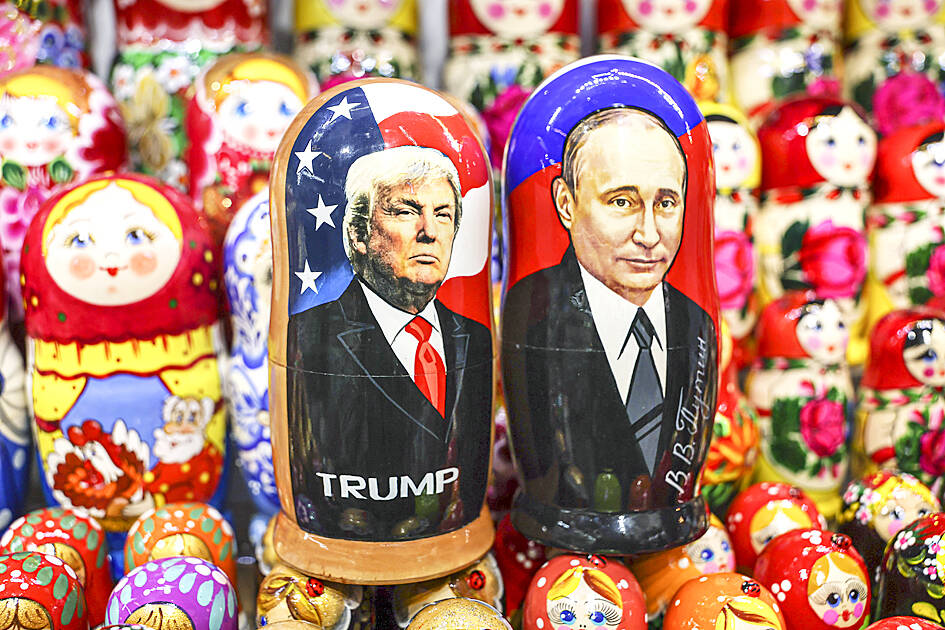US President Donald Trump on Wednesday said he expected to meet Russian President Vladimir Putin in Saudi Arabia for Ukraine peace talks, in an extraordinary thaw in relations after a surprise phone call between the two leaders.
In their first confirmed contact since Trump’s return to the White House, the US president said he had held a “lengthy and highly productive” conversation with his Russian counterpart who ordered the 2022 invasion of Ukraine.
However, the move sparked concerns that Ukraine would be left out of talks on its own fate, after Trump said Kyiv’s wish to join NATO was not “practical” — a key demand of Moscow.

Photo: EPA-EFE
Trump, who has been pushing for a quick end to the nearly three-year war, denied that Ukraine was being excluded from the direct negotiations between the two nuclear-armed superpowers.
“We expect that he’ll come here, and I’ll go there — and we’re going to meet probably in Saudi Arabia the first time,” Trump told reporters in the Oval Office about his plans to meet Putin.
Trump said he expected it to happen “in the not too distant future” and added that Saudi Arabian Crown Prince Mohammed bin Salman — who played a key role in a Russia-US prisoner exchange this week — would also be involved.
The Kremlin said the call lasted nearly one-and-a-half hours. The two leaders had agreed that the “time has come to work together” and that Putin has invited Trump to Moscow, it said.
Trump took the world by surprise as he announced the phone call on his Truth Social platform earlier, saying he and Putin had “both agreed, we want to stop the millions of deaths taking place in the War with Russia/Ukraine,” using an unconfirmed figure for the toll in the conflict.
The US president said they had agreed to “work together very closely, including visiting each other’s Nations” and to “have our respective teams start negotiations immediately” on Ukraine.
Trump later called Ukrainian President Volodymyr Zelenskiy, who was not included in the call with Putin.
Zelenskiy said afterward that he had a “meaningful” call with Trump in which he had “shared details” of his talks with Putin.
Trump said after the conversation that Zelenskiy “like President Putin, wants to make PEACE.”
Concern has been mounting in Kyiv and European capitals about the shape of a possible deal.
The French, German and Spanish foreign ministers on Wednesday said that there could be “no just and lasting peace” without the involvement of Kyiv and its European partners.
Zelenskiy is due to meet US Vice President JD Vance and Secretary of State Marco Rubio today at the Munich Security Conference.
See European on page 5

CHAOS: Iranians took to the streets playing celebratory music after reports of Khamenei’s death on Saturday, while mourners also gathered in Tehran yesterday Iranian Supreme Leader Ayatollah Ali Khamenei was killed in a major attack on Iran launched by Israel and the US, throwing the future of the Islamic republic into doubt and raising the risk of regional instability. Iranian state television and the state-run IRNA news agency announced the 86-year-old’s death early yesterday. US President Donald Trump said it gave Iranians their “greatest chance” to “take back” their country. The announcements came after a joint US and Israeli aerial bombardment that targeted Iranian military and governmental sites. Trump said the “heavy and pinpoint bombing” would continue through the week or as long

TRUST: The KMT said it respected the US’ timing and considerations, and hoped it would continue to honor its commitments to helping Taiwan bolster its defenses and deterrence US President Donald Trump is delaying a multibillion-dollar arms sale to Taiwan to ensure his visit to Beijing is successful, a New York Times report said. The weapons sales package has stalled in the US Department of State, the report said, citing US officials it did not identify. The White House has told agencies not to push forward ahead of Trump’s meeting with Chinese President Xi Jinping (習近平), it said. The two last month held a phone call to discuss trade and geopolitical flashpoints ahead of the summit. Xi raised the Taiwan issue and urged the US to handle arms sales to

A magnitude 5.6 earthquake struck off the coast of Yilan County at 12:37pm today, with clear shaking felt across much of northern Taiwan. There were no immediate reports of damage. The epicenter of the quake was 16.9km east-southeast of Yilan County Hall offshore at a depth of 66.8km, Central Weather Administration (CWA) data showed. The maximum intensity registered at a 4 in Yilan County’s Nanao Township (南澳) on Taiwan’s seven-tier scale. Other parts of Yilan, as well as certain areas of Hualien County, Taipei, New Taipei City, Taoyuan, Hsinchu County, Taichung and Miaoli County, recorded intensities of 3. Residents of Yilan County and Taipei received

Taiwan has secured another breakthrough in fruit exports, with jujubes, dragon fruit and lychees approved for shipment to the EU, the Ministry of Agriculture said yesterday. The Animal and Plant Health Inspection Agency on Thursday received formal notification of the approval from the EU, the ministry said, adding that the decision was expected to expand Taiwanese fruit producers’ access to high-end European markets. Taiwan exported 126 tonnes of lychees last year, valued at US$1.48 million, with Japan accounting for 102 tonnes. Other export destinations included New Zealand, Hong Kong, the US and Australia, ministry data showed. Jujube exports totaled 103 tonnes, valued at